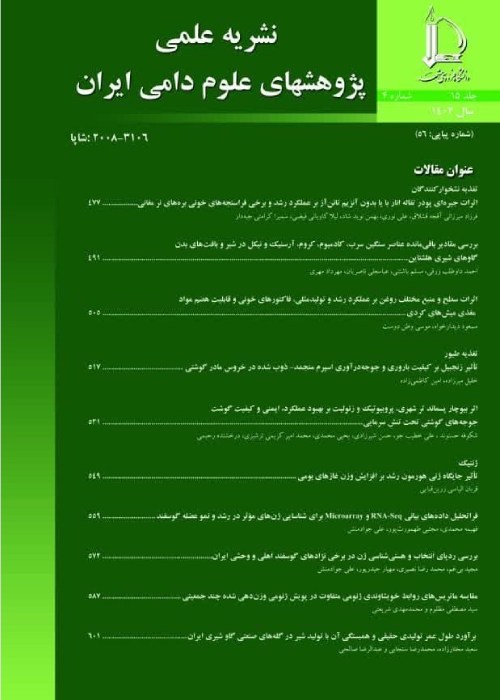Effect of Use of Mixture of Herbal Extracts on Performance, Carcass Characteristics, Blood Serum Metabolites and Enzyme Activity of Broiler Chickens
Author(s):
Article Type:
Research/Original Article (دارای رتبه معتبر)
Abstract:
Introduction In view of rising concerns on the extensive use of antibiotics in animal production, there is an increasing interest for developing alternative disease control strategy to enhance animal health and to reduce the use of antimicrobials. One promising new possibility to achieve this goal is the use of natural foods and herbal products to enhance feed efficiency, gut health, and innate immunity. In clinical medicine, plant-derived products are increasingly being used as feed supplements to enhance immunity to diseases and cancers. Among these products, the dietary effects of the mixture of three plant derived phytochemicals, carvacrol, cinnamaldehyde, and Capsicum oleoresin as anti-bacterial and anti-fungal agents have been reported. Carvacrol is a component of numerous aromatic plants, such as Origanum vulgare, thyme, and wild bergamot. The anti-microbial functions of these herbs are associated with carvacrol since carvacrol vapour has been shown to inhibit Salmonella growth in chickens. Cinnamaldehyde is a constituent of cinnamon and widely applied as flavoring. It has been proven to have strong anti-bacterial activity against Escherichia coli, Pseudomonas aeruginosa, Enterococcus faecalis, Staphylococcus aureus, Staphylococcus epidermidis, methicillin-resistant Staphylococcus aureus (MRSA), Klebsiella pneumoniae, Salmonella sp., and Vibrio parahemolyticus. Capsicum oleoresin, prepared by organic extraction of pepper fruits, contains anti-bacterial activity. It contains the pungent principles, capsicin which has effects on the resistance to Salmonella enteritidis infection by altering pH and histological changes.
Materials and Methods In this study, 160 Ross 308 male broiler chicks were allocated in a completely randomized design with 5 treatments, 4 replicates of 8 chicks in each replicate for 42 days. Treatments contained 1 level of oxytetracycline antibiotic and 3 levels of extract supplementation (50, 100 and 200 mg/kg of feed). The rearing and management conditions were equal for all groups. Experimental diets were formulated to meet the nutrients requirements of the Ross broiler chicks. Chicks had full access to feed and water during the experimental period. Performance parameter such as body weight gain, feed intake and feed conversion ratio were recorded at 1-10, 11-24 and 25-42 d of age for each replicate. At the end of the experiment, two birds of each replicate were slaughtered and blood was collected to determine hematological parameters, and carcass characteristics were analyzed.
Results and Discussion Based on the results, in 1-10 d period supplementing the broiler diet with 100 mg/kg herbal extracts decreased significantly feed intake (P
Materials and Methods In this study, 160 Ross 308 male broiler chicks were allocated in a completely randomized design with 5 treatments, 4 replicates of 8 chicks in each replicate for 42 days. Treatments contained 1 level of oxytetracycline antibiotic and 3 levels of extract supplementation (50, 100 and 200 mg/kg of feed). The rearing and management conditions were equal for all groups. Experimental diets were formulated to meet the nutrients requirements of the Ross broiler chicks. Chicks had full access to feed and water during the experimental period. Performance parameter such as body weight gain, feed intake and feed conversion ratio were recorded at 1-10, 11-24 and 25-42 d of age for each replicate. At the end of the experiment, two birds of each replicate were slaughtered and blood was collected to determine hematological parameters, and carcass characteristics were analyzed.
Results and Discussion Based on the results, in 1-10 d period supplementing the broiler diet with 100 mg/kg herbal extracts decreased significantly feed intake (P
Keywords:
Language:
Persian
Published:
Iranian Journal of Animal Science Reaserch, Volume:9 Issue: 4, 2018
Pages:
446 to 460
magiran.com/p1820359
دانلود و مطالعه متن این مقاله با یکی از روشهای زیر امکان پذیر است:
اشتراک شخصی
با عضویت و پرداخت آنلاین حق اشتراک یکساله به مبلغ 1,390,000ريال میتوانید 70 عنوان مطلب دانلود کنید!
اشتراک سازمانی
به کتابخانه دانشگاه یا محل کار خود پیشنهاد کنید تا اشتراک سازمانی این پایگاه را برای دسترسی نامحدود همه کاربران به متن مطالب تهیه نمایند!
توجه!
- حق عضویت دریافتی صرف حمایت از نشریات عضو و نگهداری، تکمیل و توسعه مگیران میشود.
- پرداخت حق اشتراک و دانلود مقالات اجازه بازنشر آن در سایر رسانههای چاپی و دیجیتال را به کاربر نمیدهد.
In order to view content subscription is required
Personal subscription
Subscribe magiran.com for 70 € euros via PayPal and download 70 articles during a year.
Organization subscription
Please contact us to subscribe your university or library for unlimited access!




